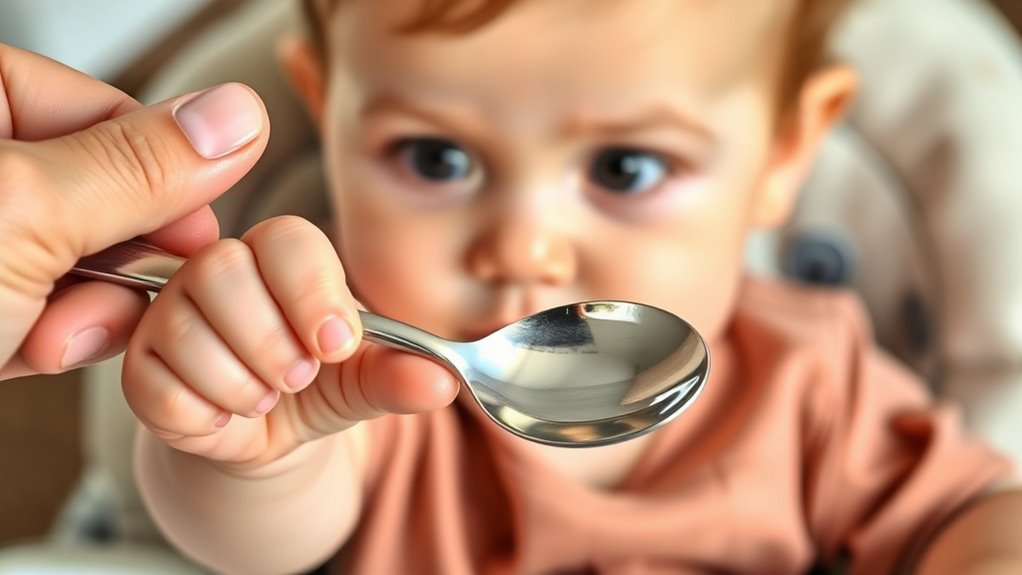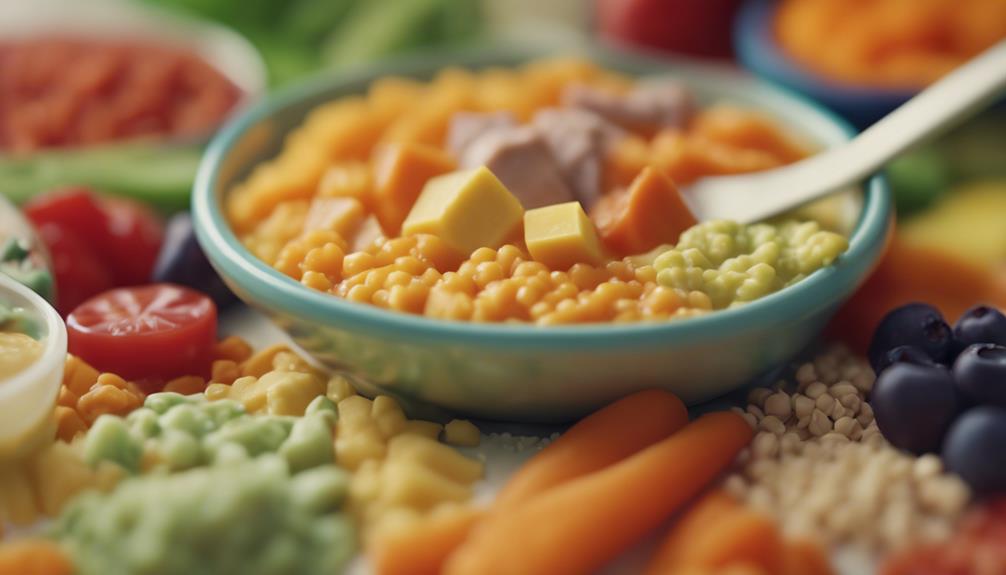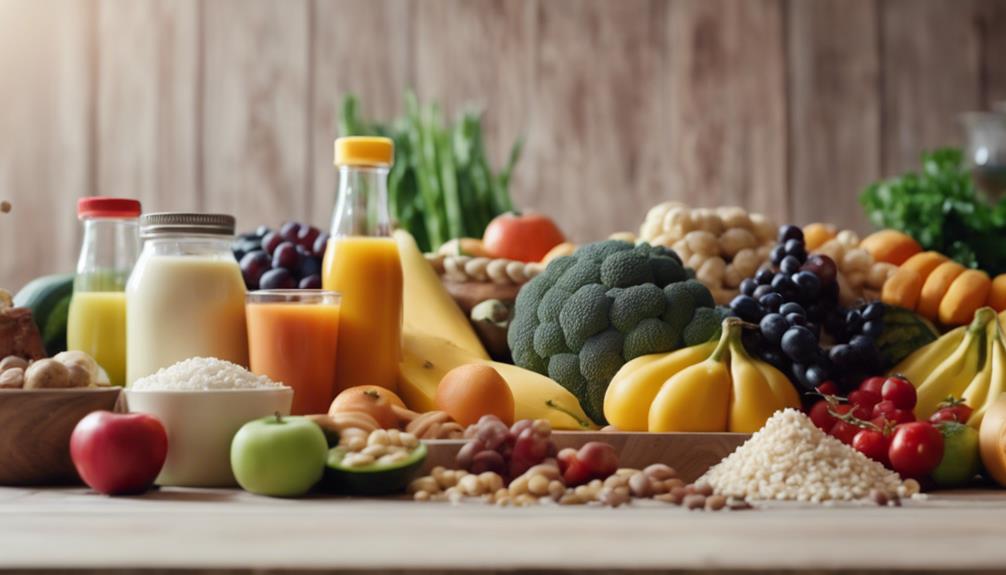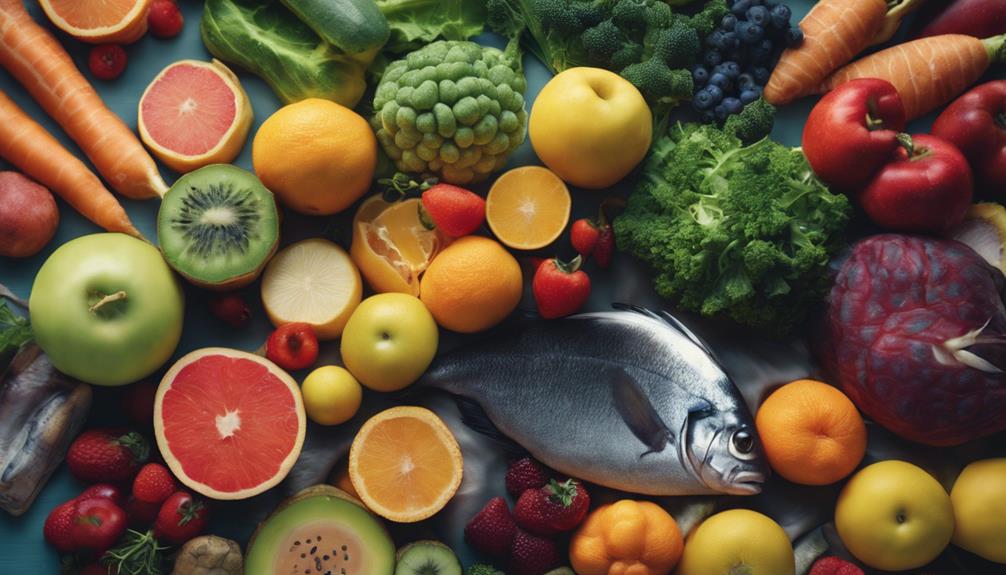You can start teaching your baby to use a spoon around 6 to 9 months when they show signs of teething and better mouth and hand coordination. Begin by offering soft, easy-to-eat foods on a small, gentle spoon, and supervise closely to prevent choking. Use calm, patient encouragement, and accept messiness as part of learning. As your baby practices, they gain improved motor skills. Keep exploring these tips to help your little one become a confident eater.
Key Takeaways
- Begin introducing soft, baby-friendly spoons around 6-9 months as signs of teething and mouth development emerge.
- Start with simple, mashed foods and allow your baby to grasp and explore the spoon at their own pace.
- Always supervise mealtime to ensure safety and prevent choking, and check food temperature before feeding.
- Encourage practice by offering the spoon during calm, relaxed meals to develop hand-eye coordination and motor skills.
- Be patient and positive, celebrating small successes to build confidence and establish healthy eating habits over time.

Have you ever wondered how utensils became essential in our daily lives? It’s fascinating to think about how, over time, people developed tools that make eating easier and more efficient. Introducing utensils to your baby is a big step in their development, and understanding when and how to do it can make the process smoother. The journey begins with recognizing teething milestones, which are key indicators that your little one is ready to start exploring with utensils. Usually, around six to nine months, many babies start to show signs of teething, such as drooling more than usual, biting on objects, and trying to grasp things with improved coordination. These milestones are important because they suggest your baby’s mouth and hand skills are developing enough to attempt self-feeding. However, it’s vital to be patient and not rush this stage, as each child progresses at their own pace.
When you decide it’s time to introduce a spoon, safety precautions should be your top priority. Start with soft, lightweight spoons designed specifically for babies, which are gentle on their gums and easy for small hands to hold. Always supervise your child during mealtime to prevent choking hazards and ensure they don’t put the spoon too far into their mouth. It’s normal for babies to make a mess at this stage—don’t get discouraged; it’s part of learning. Keep the first few attempts simple by offering soft, easy-to-eat foods like mashed fruits or yogurt that won’t cause frustration if spilled or messy. Be patient and encouraging, celebrating small successes to build their confidence. Developing good eating habits early on can set the foundation for healthy lifelong habits.
As your baby practices with a spoon, they’ll develop hand-eye coordination and fine motor skills, which are vital for independence later on. Remember to always check the temperature of the food and the spoon before feeding, making sure nothing’s too hot or cold. It’s also a good idea to introduce the spoon during calm, relaxed mealtimes so your baby can focus on learning without feeling overwhelmed. Gradually, they’ll gain better control and start to feed themselves more effectively. Keep in mind that every child learns at their own pace, so don’t rush the process. With patience, safety precautions, and lots of encouragement, you’ll help your little one develop not just a new skill, but also confidence in their ability to feed themselves.
Frequently Asked Questions
When Should I Start Introducing Utensils to My Baby?
You should start introducing utensils when your baby reaches early developmental milestones and shows teething readiness, usually around 6 to 9 months. Watch for signs like grasping objects and sitting steadily. Once they’re comfortable holding small items and can manage their mouth movements, it’s a good time to gently introduce a spoon. Keep it fun and patient, encouraging independence while supporting their growing skills.
How Do I Encourage My Baby to Hold a Spoon Properly?
To encourage your baby to hold a spoon properly, focus on developing their grip and hand-eye coordination. Offer a lightweight, easy-to-hold spoon and let them practice grasping it during mealtime. You can also demonstrate how to hold the spoon and guide their hand gently. Praise their efforts and be patient; with time, their grip will improve, making feeding more independent and enjoyable.
What Are the Best Types of Spoons for Beginners?
Imagine your baby trying their first spoonful—choosing the right one is essential. Opt for beginner spoons with ergonomic design, featuring soft, rounded edges and a small, shallow bowl for easy handling. Safety considerations are vital, so pick BPA-free, non-toxic materials. These spoons help your little one develop coordination while ensuring comfort and safety during mealtime, making the learning process smoother and more enjoyable.
How Can I Make Mealtime Less Messy for My Baby?
You can make mealtime less messy by establishing consistent routines that encourage baby self-feeding. Use bibs and a placemat to protect surfaces, and opt for easy-to-hold utensils to help your baby grasp and practice feeding independently. Stay patient and offer gentle guidance, allowing your baby to learn through exploration. Keeping mealtime relaxed and positive helps your little one develop confidence while reducing messes naturally.
Are There Signs My Baby Is Ready to Learn Utensil Use?
Like a budding flower ready to bloom, your baby shows signs of readiness through developmental milestones. Look for them grasping a spoon with both hands, showing interest in feeding themselves, or trying to bring food to their mouth. These cues indicate they’re developing the coordination needed for utensil use. When you notice these signs, it’s the perfect time to gently introduce utensils and encourage their growing independence.
Conclusion
By patiently guiding your baby to use a spoon, you’re opening the door to a world of independence that’s almost as big as the universe itself. Remember, every small attempt is a giant leap toward confident self-feeding. Keep encouraging and celebrating their progress, even if it takes a while. Before you know it, they’ll be mastering utensils with the finesse of a seasoned pro, turning mealtime into a fun adventure that’s truly out of this world!










